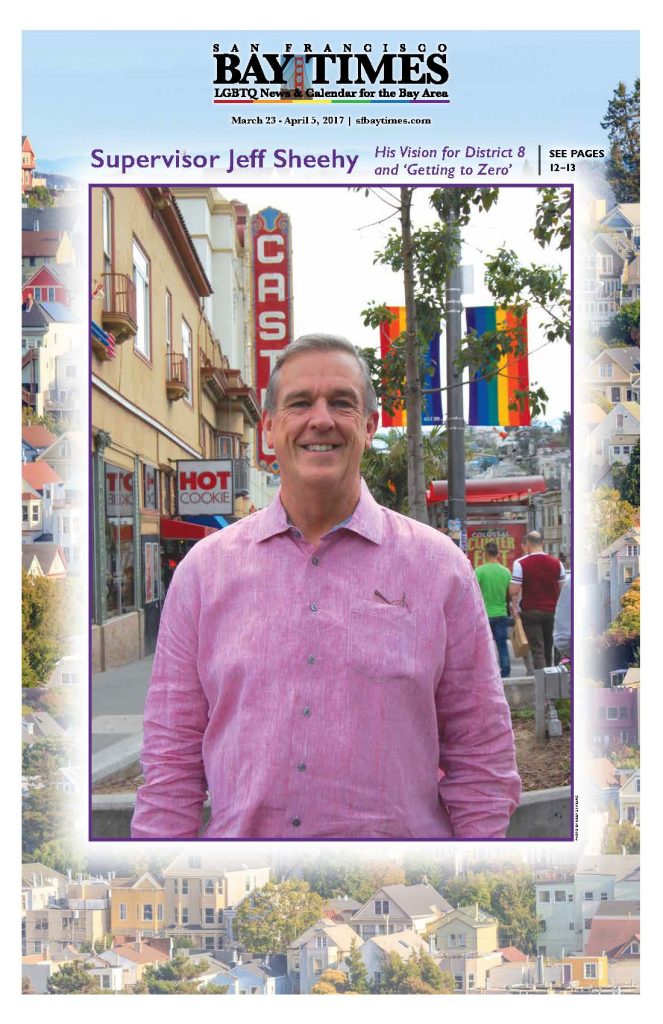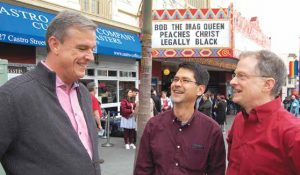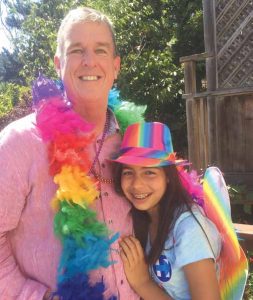
Supervisor with a Purpose: An Interview with San Francisco Supervisor Jeff Sheehy
By Stuart Gaffney and John Lewis
The morning after Jeff Sheehy’s historic appointment to the San Francisco Board of Supervisors this January, Stuart went to work at his job at the University of California San Francisco and walked over to Jeff’s desk to congratulate him. Jeff and Stuart had been long time colleagues—Jeff at the UCSF AIDS Research Institute (ARI), and Stuart across the office at the UCSF Center for AIDS Prevention Studies (CAPS). We had long known of Jeff as an LGBTQ activist and political leader, but it was at UCSF where Jeff and Stuart worked side-by-side on HIV/AIDS research and prevention that he got to know Jeff as a colleague and a friend.
As Director of Communications at ARI, Jeff played a central role in the institute’s mission to coordinate and integrate all of UCSF’s AIDS research activities. Stuart and his colleagues at CAPS turned to Jeff many times over the years for his communications expertise as CAPS behavioral research grew to become the gold standard in HIV prevention from its origins in 1986 up through its 30th anniversary last year.

But, of course, when Stuart went over to Jeff’s desk to congratulate him, he didn’t find him there. Jeff had already rolled up his sleeves and gotten to work at his new desk in San Francisco City Hall. We have since found opportunities to congratulate him at community gatherings, such as the recent Trans Youth rally on the steps of San Francisco City Hall.
Jeff has hit the ground running in his new job as Supervisor, and last week we had a chance to sit down with him to talk about HIV/AIDS, healthcare, and where San Francisco and the country are headed.
Stuart and John: Thank you very much, Jeff, for taking time to speak with us and San Francisco Bay Times readers. As you know, people living with HIV/AIDS, LGBTQ people, and many other San Franciscans are deeply concerned about how the new administration in Washington will affect our lives. With respect to HIV/AIDS, San Francisco has been a leader in care and prevention for decades, and the world looks to the San Francisco Model of care. How is San Francisco preparing to safeguard the San Francisco Model of HIV/AIDS care and prevention in the face of the new presidential administration and Congress?
Jeff: Funding for the San Francisco Model of care exists within a larger federal budget framework. In these unprecedented times, the City faces cuts due to this administration’s attempts to undo the Affordable Care Act, threats to take funding away from sanctuary cities and draconian cuts to many discretionary programs proposed in Trump’s budget. At the Board of Supervisors, President London Breed has established the Federal Select Subcommittee of the Budget Committee to specifically work on responding to federal cuts. I served on both that subcommittee and the larger five-member Budget Committee and I am committed to preserving our model of care not only for people living with HIV, but also for all San Franciscans who rely on City programs for their health care.
Under the leadership of Tom Ammiano, Gavin Newsom and Mitch Katz, the City set up Healthy San Francisco and that program provided coverage to many San Franciscans. Many individuals moved from Healthy San Francisco to either MediCal or Covered California under the ACA, but Healthy San Francisco still exists and is available if needed. And, San Francisco’s leaders all stand united and determined to support our immigrant brothers and sisters and support for our sanctuary city policy is unwavering.
Stuart and John: What are your priorities for Getting to Zero HIV infections in San Francisco?
 Jeff: First, the goals of the “Getting to Zero” Consortium include more than just achieving zero new transmissions. As one of the founders of the Consortium, our goals—based on UNAIDS [The Joint United Nations Programme on HIV and AIDS] goals—also seek to achieve zero preventable HIV deaths and zero HIV stigma. Targeting just transmissions leaves people living with HIV out of the equation and would ultimately fail. Expanding HIV testing, ensuring access to PrEP and other prevention interventions, linking people newly diagnosed with HIV to care and starting treatment immediately, retaining people in care by addressing all of the issues that make staying in care difficult such as housing, mental health and substance use, re-engaging people with HIV lost to care and reducing and eliminating stigma are all part of the comprehensive package necessary to “Get to Zero.”
Jeff: First, the goals of the “Getting to Zero” Consortium include more than just achieving zero new transmissions. As one of the founders of the Consortium, our goals—based on UNAIDS [The Joint United Nations Programme on HIV and AIDS] goals—also seek to achieve zero preventable HIV deaths and zero HIV stigma. Targeting just transmissions leaves people living with HIV out of the equation and would ultimately fail. Expanding HIV testing, ensuring access to PrEP and other prevention interventions, linking people newly diagnosed with HIV to care and starting treatment immediately, retaining people in care by addressing all of the issues that make staying in care difficult such as housing, mental health and substance use, re-engaging people with HIV lost to care and reducing and eliminating stigma are all part of the comprehensive package necessary to “Get to Zero.”
And my goals mirror those of the Consortium, which at last glance included over 200 members from all sectors—public health, healthcare providers, community based organizations and the community. The Consortium, through its multi-sector subcommittees, creates initiatives with both process and outcome metrics and budgets. I fully support the ongoing initiatives put forward by the Consortium and will support its work going forward. For more information about the Consortium, please go to: https://www.gettingtozerosf.org
Stuart and John: What can we do as individual citizens to advocate and help protect the “San Francisco Model” of HIV/AIDS care and the city’s other programs to provide quality health care for all its citizens?
Jeff: I believe the priority should be to preserve the Affordable Care Act. And, the best way is to talk to Republicans in Congress and the Senate and/or their constituents. For instance, I have phonebanked Southern California Congressmen and urged them to support the ACA. Others have gone to Bakersfield, a city where half the population gets healthcare via MediCal or Medicare, and talked directly to voters and urged them to talk to their Congressman. Others have gone to Republican members’ Town Halls. Informing Republican members’ constituents of the real and true consequences of proposed changes to ACA not only helps to preserve the ACA but also starts to set the stage for the 2018 midterm elections.
Stuart and John: How have your years of experience working with the UCSF AIDS Research Institute informed your leadership and your activism?
Jeff: Working with some of the leading HIV/AIDS researchers and clinicians kept me abreast of the latest developments in HIV prevention and clinical care. Mentors such as Tom Coates and Steve Morin [former CAPS Directors and worldwide leaders in HIV/AIDS prevention research] showed me what it takes to be a successful leader and inspired me.
Stuart and John: What lessons do you think we can draw from the waves of activism during the worst years of the AIDS crisis, and following the passage of Prop. 8?
Jeff: We know that active, vigorous peaceful resistance works. During the AIDS crisis, which is not over, a nation and the world have been moved to act. Strident, persistent and insistent action, along with the active demonstration of our love, stood in stark contrast to the hate and bigotry we faced. When people get to know people with HIV, when people get to know gay men and lesbians, when they feel the power of our love, they change.

Stuart and John: What has your experience so far as a Supervisor taught you about the significance of your public profile as being HIV positive, and as a married gay man raising a family?
Jeff: I would also add to that list being a medical cannabis patient. What I know and have known is that stigma exists, whether it is directed towards LGBTQ folk, people with HIV/AIDS or medical cannabis users. And the best way to combat stigma is to let people know who you are and to assert your identity without shame or fear.
I also think that my identity represents the remarkable achievements of our community and I stand in awe of everyone who has worked over the years to make my life possible. Yes, I have put a brick or two into the towering edifice, but collectively with great sacrifice and enormous effort, we have achieved so much! If you had told me when I came out in 1979 that I would be married and have a family, I wouldn’t have believed you. And in the early 80s, I did not believe that I would live to see 40, much less 60, which I will turn in about a month. So, on one hand, there are so many people and so much history to honor; on the other hand, not everyone in our community is flourishing. I think of long-term survivors who struggle every day, and I am working to start to address some of the issues they face. I think of LGBTQ folks who are denied their human rights, the trans and gender non-conforming kids who exhibit such awe-inspiring courage and who are targets of the Trump administration. We still have so much work to do.
Stuart and John: Would you like to share anything regarding your vision as Supervisor for the Castro, District 8, and San Francisco more broadly?
Jeff: As I mentioned above, resisting Trump is a key. Keeping our healthcare safety net, sustaining our sanctuary city status and protecting our immigrant brothers and sisters, and supporting our Muslim brothers and sisters are immediate priorities. But, we also have a housing crisis. We need to protect tenants from evictions. We need to create more housing at all levels, but especially at affordable rates for low and middle income people. We need to preserve affordable housing in our neighborhoods, and I want to use the small sites program to the greatest degree possible in District 8. Homelessness remains a daunting challenge that we must continue to address. The new Department of Homelessness is promising and with budget support in this cycle, I hope we will see some progress.
Stuart and John: We understand that you are a longtime reader of the San Francisco Bay Times and have known or worked with members of its team through the years. Are there any memories or impressions that you’d like to pass along to readers?
Jeff: Sister Dana is a community treasure, everywhere, every day chronicling our lives and times. I can’t count the number of times I was expertly interviewed by Ann Rostow back in the day before I dropped off the radar to raise our daughter. And, of course, Rink Foto. It is so great to see him snapping away at every event. One of the things I missed when I was out of circulation was Rink sidling up to me, whispering in my ear the latest gossip.
I think we have forgotten how important the queer press is. When I led and we won the national boycott against United Airlines in support of the Equal Benefits Ordinance that I helped create and which brought health and pension benefits to hundreds of thousands of gay men and lesbians across the country, our key avenue for communication was our queer press. Whether the Bay Times, Windy City News out of Chicago, Southern Voice, Washington Blade or other publications, many of which are gone, that was all we had. The mainstream media would not cover us for fear of losing ads. But our press was there, and we need to continue to support a vigorous and active queer press.

John Lewis and Stuart Gaffney, together for over three decades, were plaintiffs in the California case for equal marriage rights decided by the California Supreme Court in 2008. Their leadership in the nationwide grassroots organization Marriage Equality USA contributed in 2015 to making same-sex marriage legal nationwide.
Recent Comments